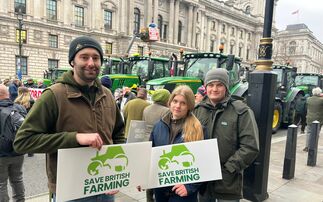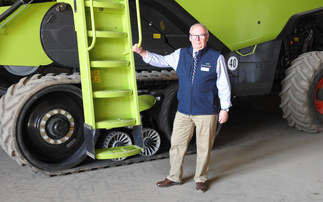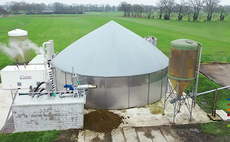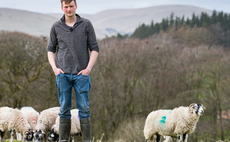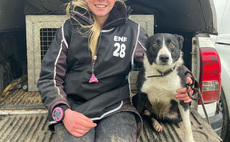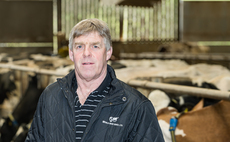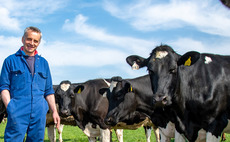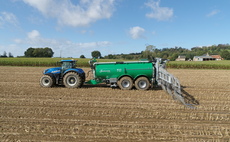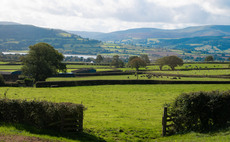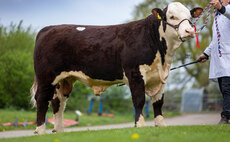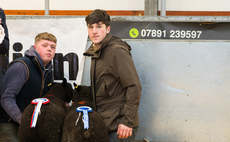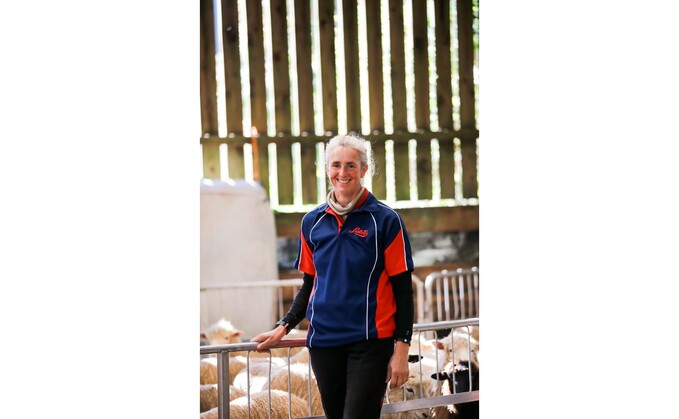
Brought up on a smallholding in Alton, Hampshire, Susie Parish has been around sheep since a young age. She had pet lambs as a girl, which eventually formed the basis of a 50-head flock.
Susie recalls how one year the shearer did not turn up, so – as a self-proclaimed ‘doer' – she set about with a pair of hand shears.
She says: "It was after organophosphate [OP] dips were banned and before the introduction of pour-ons, and the sheep were beginning to suffer with fly strike. I had a book which described how to shear a sheep, so my brother read bits to me while I worked away with a pair of shears."
After being turned away from Sparsholt College's shepherding course aged 17 and told to return when she was older, Susie began working locally as a shepherd, mainly carrying out lambing work.
She says: "I learnt an awful lot while working. By taking on various jobs, I was lambing for four or five months of the year, and I then did a bit of wool rolling for a shearing gang. At that age, I was too scared to ask the shearers for advice, so I just watched them. For the rest of the summer, I was on a tractor and then worked with horses in the winter."
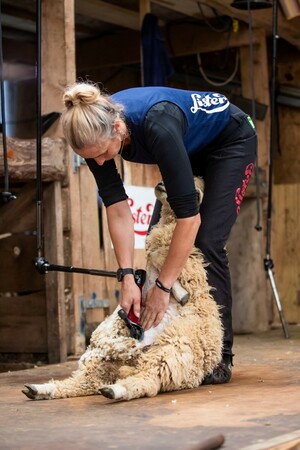
As Susie's own shearing improved, she joined the Small Shepherds' Club's approved shearing list, and through this her own business grew.
At the same time, she was assisting her brother with his contracting business, doing tractor work that was needed at the time.
It was while baling straw for husband and wife Emma and Neil Boyles that Susie's next move was to be determined. Having recently purchased a farm, Emma and Neil asked Susie for some help with their ponies. The couple were also keen to buy some sheep, and because they did not have any previous experience, a shepherd was required – Susie was an obvious fit.
READ NOW: Growing market for native breed wool
To begin, a small flock of Southdowns was purchased by Emma and Neil for their 'teddy bear' appearance. As time went on and Emma's sheep knowledge grew, she could not believe the lack of value in a sheep's fleece and wanted to do something to add value to the product.
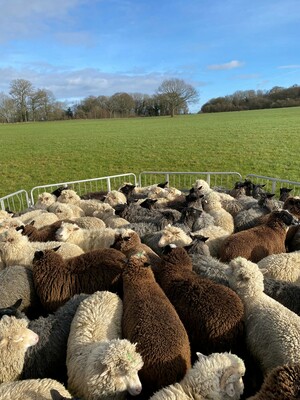
Wool was sent away to be spun, and Emma and Susie began experimenting with different methods of dying the fibre – the beginning of what was to become The Grey Sheep Co.
Susie says: "The Southdown wool did not make a very good knitting wool. It consists of a short fibre, so was more suited to carpet manufacturing."
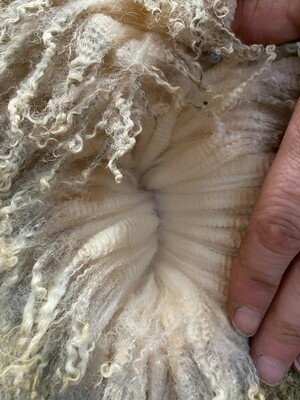
From there, a trip to the Sheep Event at Malvern led to Neil and Emma discovering the Gotland breed. Originating from the Swedish island of Gotland by the Vikings, this breed has a lustrous fleece with colours ranging from black through to silver.
Susie says: "We were the first to dye coloured wool. When it is dyed, the natural colour brings a lot more tones to finished wool."
These days, the farm is home to a 450-strong flock consisting of equal numbers of pure Gotlands and a cross breed containing a lot of Merino blood, which Susie and Emma breed themselves and have coined the 'Stein'.
Not all ewes are lambed every year, and like many other wool-producing flocks around the world, wethers are run on to be shorn and remain in the flock – Susie's main priority is keeping the sheep's fleeces as clean as possible.
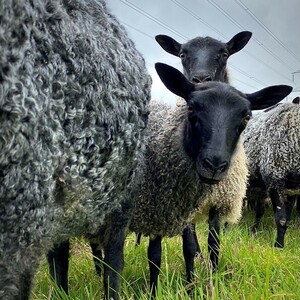
At the end of December/early January, the flock is shorn before being brought inside to shelter and to lamb, avoiding any straw and hay attaching to the fleece when the sheep are inside. Part of Susie's strategy is to treat any lameness quickly to reduce the amount of time sheep spend lying down and dirtying the fleece. She shears the animals' back ends and also keeps on top of weeds in fields which might get stuck to fleeces.
Susie says: "Keeping sheep in this way has been a huge learning curve."
At the end of May, the Gotlands are shorn again for a trim-up which helps to strengthen their next full fleece. But due to the difference in the way their wool grows, the Steins do not require shearing more than once a year.
READ NOW: FG180: King Charles focuses on greater value of British sheep and wool

Wool from The Grey Sheep Co is shipped globally to home-knitters or into wool shops.
As a British Wool ambassador, Susie travels around shows supporting the team, and for a long time she has also been the Hampshire representative for British Wool.
She says: "Going to shows and promoting the uses of wool is really important to me.
"Wool has a monetary value, but it has a huge importance as a product. It is great for the environment, and having already been produced by the sheep, it should be made use of.
"British Wool supports the supply chain from collection to processing and marketing, and develops new products – the new wool rope being one great example. The organisation needs volume to benefit from economies of scale."
Still with her own shearing run of 6,000 sheep as well as alpacas and llamas, Susie was taken on by British Wool as their first approved female shearing instructor a number of years ago, after going on a shearing course to improve her skills.
"There were so many people there, I ended up helping other participants on the course," she says.
"At the end of the day, I was asked if I would consider being an instructor, and after some persuasion I accepted. I have been instructing ever since, teaching beginners and intermediates."
LISTEN NOW: Íæż½ã½ã Podcast: What happened to wool?
She also enjoys sharing her knowledge with schoolchildren. Previously, she has been live-streamed into schools while shearing a sheep as part of the NFU's schools project, with over 160,000 children watching.
Susie also had her moment on TV, as she sheared a sheep on Alan Titchmarsh's Spring into Summer and also live on the Jeremy Vine show.
She says: "In these situations, whether talking to school kids or on the TV, the main message I want to get across is that shearing does not hurt the animal – that is really important."
Appointed earlier this year as the National Sheep Association South East Region chair, Susie works as part of a team to put on events and knowledge exchange opportunities.
She reflects on her connection to Young Íæż½ã½ã and how ‘when that came to an end, I was always looking for the next thing to be involved with'.
Also a BISCA-approved shearing judge, Susie says she has been more active as a competitor in recent times, competing at the major county shows.
Wool handling is her latest venture – she has recently started competing as a novice and came second at the Royal Welsh Spring Festival this year.
She says: "There is a shortage of wool handling judges, and I would like to help out by becoming one. In order to do that successfully, I think it is really important to compete first to truly understand the competition. It is really technical."
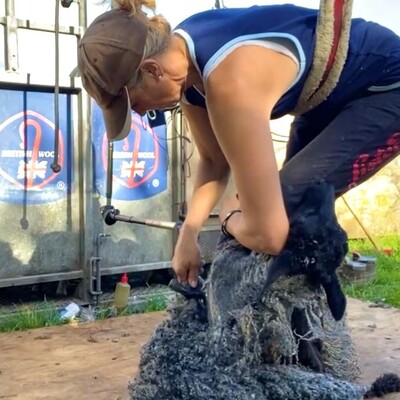
Blade shearing competitions, using a traditional pair of hand shears, are another passion of Susie's. This year, she won the Intermediate Blades Shearing Circuit, and next year she will compete in the open. She says it is 'quite addictive', and she has an appetite to continue to get better.
"It is a good sport to get into, as if you have just a few sheep to shear at home it is a cheap and enjoyable way of shearing them. The sheep are a lot calmer when they are blade-shorn as there is no noise or vibrations produced by a machine," says Susie.
Machine shearing is another of Susie's disciplines, and she has won the ladies competition at the Royal Welsh Show several times.
And this is where her passion ultimately lies: being a representative of the British wool industry, but also showcasing the opportunities available.









